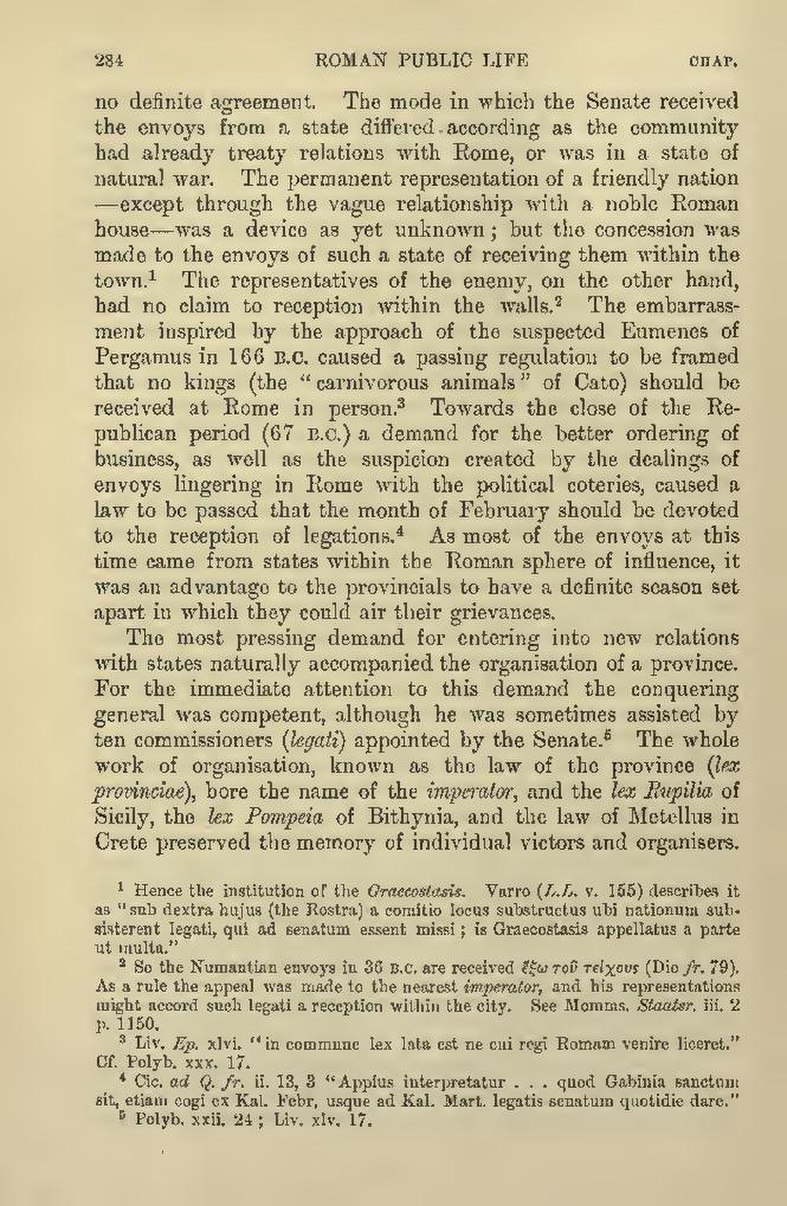no definite agreement. The mode in which the Senate received the envoys from a state differed according as the community had already treaty relations with Rome, or was in a state of natural war. The permanent representation of a friendly nation—except through the vague relationship with a noble Roman house—was a device as yet unknown; but the concession was made to the envoys of such a state of receiving them within the town.[1] The representatives of the enemy, on the other hand, had no claim to reception within the walls.[2] The embarrassment inspired by the approach of the suspected Eumenes of Pergamus in 166 B.C. caused a passing regulation to be framed that no kings (the "carnivorous animals" of Cato) should be received at Rome in person.[3] Towards the close of the Republican period (67 B.C.) a demand for the better ordering of business, as well as the suspicion created by the dealings of envoys lingering in Rome with the political coteries, caused a law to be passed that the month of February should be devoted to the reception of legations.[4] As most of the envoys at this time came from states within the Roman sphere of influence, it was an advantage to the provincials to have a definite season set apart in which they could air their grievances.
The most pressing demand for entering into new relations with states naturally accompanied the organisation of a province. For the immediate attention to this demand the conquering general was competent, although he was sometimes assisted by ten commissioners (legati) appointed by the Senate.[5] The whole work of organisation, known as the law of the province (lex provinciae), bore the name of the imperator, and the lex Rupilia of Sicily, the lex Pompeia of Bithynia, and the law of Metellus in Crete preserved the memory of individual victors and organisers.(Dio fr. 79). As a rule the appeal was made to the nearest imperator, and his representations might accord such legati a reception within the city. See Momms. Staatsr. iii. 2 p. 1150.]
- ↑ Hence the institution of the Graecostasis. Varro (L.L. v. 165) describes it as "sub dextra hujus (the Rostra) a comitio locus substructus ubi nationum subsisterent legati, qui ad senatum essent missi; is Graecostasis appellatus a parte ut multa."
- ↑ So the Numantian envoys in 36 B.C. are received [Greek: exô tou teichous
- ↑ Liv. Ep. xlvi. "in commune lex lata est ne cui regi Romam venire liceret." Cf. Polyb. xxx. 17.
- ↑ Cic. ad Q. fr. ii. 13, 3 "Appius interpretatur . . . quod Gabinia sanctum sit, etiam cogi ex Kal. Febr. usque ad Kal. Mart. legatis senatum quotidie dare."
- ↑ Polyb. xxii. 24; Liv. xlv. 17.
